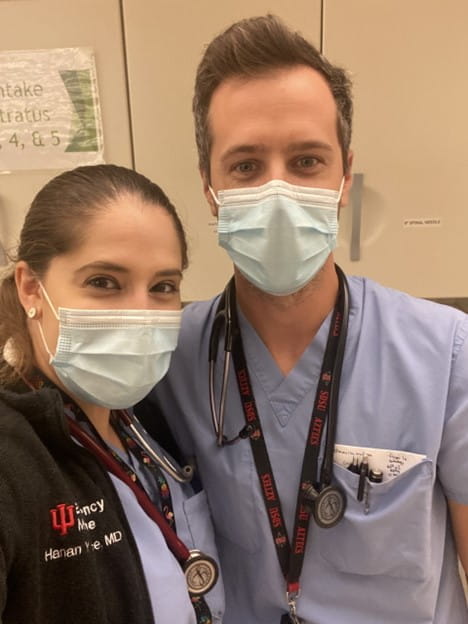It's been 137 days since Dr. Hanan Curtice completed her residency training program. Likely not a surprise to anyone who knows her, Hanan is thriving in her new role at Community Health Network. In a recent conversation, we asked Hannan what she learned and experienced at IUEM that has contributed to her early success as a physician.
In thinking about this, she shared that beyond the excellent clinical training, the skills she learned while serving as a chief resident are instrumental to her early success. In the residency program, chiefs are not simply selected; they are elected by other residents and faculty. Being elected as a chief speaks volumes about the respect that Dr. Curtice's faculty and colleagues had for her. Dr. Joe Turner, residency program director, noted that being a chief resident means being approachable, a good communicator, dependable and organized. Joe was quick to note that Hanan possessed each of these traits. He shared, "She was a very good communicator, I think, because she genuinely cared about everyone, and that gave everything she said a lot of authenticity." Beyond being a strong leader and well-regarded by her peers, Joe noted that Hanan was also a strong performer while working clinically. He reflected, "it's important [strong clinical skills] because it helps garner respect from the rest of the residents and faculty. It allowed her to serve as a great role model in the department in addition to when she was functioning in the chief role."
As a chief resident, Hanan served as a key mentor and advocate for residents, setting a positive tone for the program. She and her co-chiefs served as a bridge between other residents and leaders in the department. This, of course, is no easy task. Wearing multiple hats simultaneously comes with great responsibility and pressure. Hanan shared that one notable challenge was liaising between the faculty and residents. This included assigning tasks, resolving conflicts, and ensuring the program ran smoothly while at the same time advocating for the residents and ensuring their concerns were heard and addressed by program leadership. As a result, she further developed her leadership and management skills. Importantly, she also experienced great joy while serving as a chief. In addition, serving as a chief was an excellent opportunity for personal and professional growth as well.
Hanan shared that part of her role as chief was "being a collective voice for the residents. We would inform residents of changes in the program and inform leadership on how these changes were perceived. We always tried to strive for a better residency where our residents keep having their voices heard."
Understanding how to ensure people are heard and making meaningful improvements are skills she uses each day as she now walks in the doors of one of the Community Health emergency departments.
Hanan's passion for helping others wasn't just confined to her peers. She not only made the lives of fellow residents easier but also improved the lives of her patients. She credits her diverse background for being able to do that. She was born in Puerto Rico and moved to Chicago when she was three. She is also the only one in her family to graduate college and become a doctor. Hanan shared that speaking Spanish as her first language allowed her to help communicate with many Spanish-speaking patients at Sidney and Lois Eskenazi Hospital. Hanan noted, "Being able to approach patients from a different perspective and angle and help them with financial resources [can make a big impact]. I think a lot of us don't realize the biggest barrier is finances. We have resources to help patients; we just have to help bridge them to those resources."
Hanan's influence doesn't stop at the ED. Women in leadership positions provide a path for others to follow. She firmly believes that the world of emergency medicine needs more female voices, and Hanan made it clear she didn't get to where she is today alone. She's had many other women mentors, including faculty Drs. Andreia Alexander and Marla Doehring. These women played a crucial role in her journey, providing guidance, empowerment, and support. Hanan reflected on her mentors and shared, "Dr. Alexander has been incredible. She has been a mentor since my intern year. It's really hard to be a female in emergency medicine. She goes above and beyond leading the microaggression curriculum and does a lot of disparity work. She's been a great help to me."
Hanan says seeing other people from underrepresented backgrounds trying to achieve the same goal is exciting but wants others to know you can ask for help. She commented, "Know you aren't alone, not only as a woman in emergency medicine, but a person striving to do something that no one in your family or no one that you've known has done. Ask questions; there are no stupid questions. There is always someone willing to help. You might face hurdles along the way, but I always tell people to put mind over matter."
Hanan's time at IU was transformative and has undoubtedly contributed to her early success. She commented she already feels fulfilled and rewarded in her new role and is excited to pass on what she knows about caring for patients in emergency departments to others, "I get to be a leader in my department and aid in teaching other medical professions from nurses to PAs."
Hanan's journey is a testament to the impact one individual can make with the knowledge they receive from IUEM. 151 days post-graduation, Hanan shared a powerful message, "Ambitions are never too big; it's the fear that sets you back."

